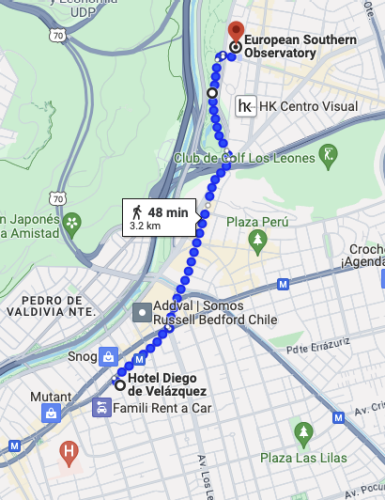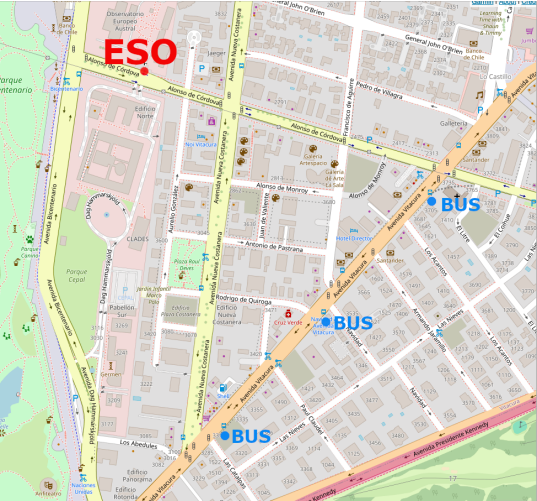Practical Information for the Participants
Dear participants, please read this page carefully as it contains important information about your travel to Chile and about the School.
Entering Chile
Depending on your country of citizenship, you may require a visa for entering Chile (for most countries in Europe and in the Americas no visa will be necessary, while for most countries in Asia and Africa it will be necessary). Check also if your passport needs to be valid for at least 6 months beyond the travel dates.
If you require a visa, then we can provide you with a letter and serve as contact in Chile. Note that ESO will not pay any costs related to visas.
Health insurance
The health system in Chile is private (US-style) and expensive. It is very important that you have a health insurance that is valid in Chile for the duration of the School. Your health insurance may have a specific hospital as partner, so please contact them to find out to which hospital you should go in case of an emergency, and inquire what your insurance actually covers. Note that in most cases you will have to pay first for medical treatment and get reimbursed by your health insurance later, so we strongly recommend that you bring a credit card with you. ESO will not pay for medical treatment.
If you are taking medication, bring sufficient medication for your stay. Medical prescriptions from outside Chile will not be accepted by Chilean pharmacies.
Transport from Santiago Airport to the hotel
If you travel to Santiago by plane, then please inform us about the date and time of arrival. ESO will book for you a taxi from Santiago Airport to the hotel, free of charge, and will send you the taxi voucher before your trip. The taxi company is called 'Transvip'. Note that the taxi voucher is valid for 24 hours, so no worries if your flight is delayed.
When in the arrival hall, before exiting the terminal building, go to the Transvip counter and show them your voucher, telling them that you are an ESO passenger. They will assign you a taxi for you - note that the reservation is for a taxi ('Taxi individual') and not a shared van ('Taxi compartido'). The taxi is already paid, so you will not have to pay anything.
If you haven't received the taxi voucher one week before the start of the School then please contact us.
Hotel Diego de Velázquez
The 'Hotel Diego de Velasquez' is located in the lively district of Providencia, about 3 km away from the ESO Chile headquarters. The address is 'Guardia Vieja 150, Providencia'. It is located between the metro stations 'Pedro de Valdivia' and 'Los Leones' of Line 1 which runs to the city center.
At the hotel, two students each will share one apartment consisting of two bedrooms and one bathroom. Breakfast from 7:00 to 9:00 is included. Santiago can be very loud at night, so you may want to bring earplugs (especially if you are a light sleeper).
ESO will book the hotel from Sunday Feb 9th afternoon until Saturday 22nd morning (with a gap in between for the travel to La Silla; So, when going to La Silla, bring all your luggage as the rooms in the hotel will have to be vacated). The hotel will be paid by ESO.
You will find plenty of restaurants and bars in walking distance from the hotel, for example, in the streets Orrego Luco, Pedro de Valdivia, Nueva de Lyon, ... note that many restaurants in Santiago close rather early, typically around 22:30.
If you need assistance or help, don't hesitate to call the hotel reception: they speak English. In the building of the apartments, there is a roof top swimming pool - check it out!
Venue: ESO Chile Headquarters
The venue of the workshop in Santiago will be the ESO Chile Headquarters which are located at:
Alonso de Cordova 3107, Vitacura.
Alonso de Cordova is a posh shopping road, and ESO is located at the end of it, close to the Parque Bicentenario and the Municipalidad (city hall) of Vitacura.
To get from the hotel to ESO, we have organized vans from Transvip that will pick you up from the reception of the hotel on Monday 10th at 9:00. The pick-up time for the other days will be later and will be announced during the meeting.
One the first day of your arrival at ESO the organizers of the Observing School will be waiting at the entrance of the ESO building from 9:00 to 9:30.
(In the afternoons, for the way from ESO to the hotel, ESO will not organize any transport.)
Quick links
ESO 2024


During the workshop at ESO Chile Headquarters
ESO will provide coffee breaks and lunches during the workshop. Please inform us about dietary restrictions at least two weeks before the start of the School so that we can plan ahead (as we need to inform the food providers in time). You are expected to pay for your dinner while being in Santiago.
The La Silla Observatory
Travel time from Santiago to La Silla will be about 9 hours, so bring a game or something to read. Lunch boxes and water will be provided for the travel.
Note that La Silla is located at an altitude of 2400 m above sea level in the Southern Atacama desert, so expect dry conditions. Bring moisturizers for your skin and lips. In February, temperatures on La Silla are typically in the range 12-18 degrees C during nights and around 20 degrees C during days.
Sun glasses and sun protection as well as good walking shoes are a must. Food and drinks will be provided at La Silla. Note that there is no possibility to do laundry there. Bring Shampoo and toiletries as the bathrooms on La Silla is equipped with basics only.
Due to ongoing renovation works, it is probable that two students each will have to share one room at La Silla.
After the School - taxi to the airport
ESO covers the night after the last day of the workshop, meaning until Saturday Feb 22nd morning. ESO will also book a taxi from the hotel to the airport for you, free of charge. Please inform us about the departure time of your flight, and we will book the pick-up time at least three hours before the departure of your flight. The taxi will already be paid, so you will not have to pay anything.
In case that your departure is on another day and/or from another location, then please let us know and we will book the taxi accordingly.
Safety in Santiago
Walking around in Santiago is usually safe when common sense is applied. In general, the districts east of the city center (Providencia, Las Condes and Vitacura) are wealthier and safer. If you plan to stay extra days in Santiago, we recommend staying in Providencia, which is a lively district that is well connected with the city center of Santiago.
A big issue are pick-pockets, and when going out, you must have your bags in sight at all times. For example, hanging a bag on the chair behind you is an absolute no-go. The same applies when taking public transportation or walking in crowded places. Valuable items should not be displayed publicly. When walking around in Santiago, you may want to leave your documents / passport in the hotel and just carry a copy of your passport with you.
Traffic can be chaotic, so act defensively, especially when crossing a road. Always watch out before crossing a road even though the traffic light shows green for you, as some drivers prefer to look at their phone rather than at the street.
Emergency phone numbers are: 131 for an ambulance, 132 for fire (Bomberos), 133 for the police (Carabineros).
Practical tips
Remember that you will be in Chile, so expect that many people will not understand English.
When going to bars or restaurants, in most cases the menu will be online, and you will have to scan a QR code with your cell phone. When paying, you will be asked if you want to add a tip ('propina', 'servicio') which typically is 10% of the total amount. In many cases the amount plus 10% tip is already outlined on the check. Paying with card is possible almost everywhere in Santiago and large cities, so it is not necessary to walk around with a lot of cash. In any case, make sure that your (credit / bank) card works in Chile (you might have to inform your bank beforehand). If you travel to rural areas, however, then bring cash as payment in restaurants may be cash only.
Chile has a 230 V / 50 Hz electricity network as in most parts of Europe. While the plugs for small devices (for example, charger for the cell phone) are compatible with the European standard ("Europlug"), larger devices (for example, a laptop charger) that have a three-pin earthed plug require a Type L plug (three pins in a row). Note that the German Schuko plug will not fit into these sockets, as its pins are too wide. At ESO, outlets for the German Schuko plugs are available.
Taxis are cheap, but they are cash only. Have small bills when taking them (1000 - 5000 Pesos bills). There is also uber.
For public transportation (bus, metro) you will need a pre-paid card 'tarjeta BIP' which you can buy and charge at any metro station; single trips cost around 700 pesos (~0.70 EUR). It's not possible to buy a ticket from the bus driver.
